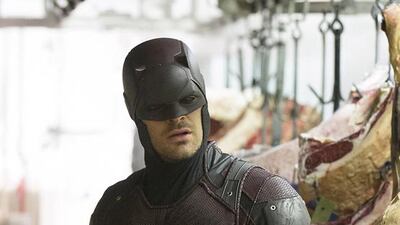Daredevil
British actor Charlie Cox returns in season two as lead character Matt Murdock/Daredevil. Blinded by chemicals in a road traffic accident as a child, and orphaned thanks to criminal gangs who killed his boxer father after his refusal to throw a fight for a mafia betting syndicate, Murdock has trained his remaining senses to superhuman levels and studied with blind martial artist Stick to become the bane of criminals in his native Hell’s Kitchen. By day he serves as a lawyer, helping those who find it hard to find representation elsewhere. His commitment to the letter of the law, as well as his religious upbringing, means that he maintains a strict moral code in his daily crime-fighting activities.
What Charlie Cox says:
Throughout season one, Matt was tormented by his inner demons and I don’t think they’re ever far away from him in season two. He hasn’t completely reconciled those demons, but, with season two, as I remember it, he just doesn’t have as much time to dwell on them. Last year [in season one], Matt had a singular purpose in finding [season one’s key villain] Wilson Fisk. He had a lot of time when he didn’t know where to to turn and had a lot of time to think and feel about what he was doing.
In season two, there’s just too much going on. There are too many organisations, too many bad guys, too many run-ins with Elektra, and he just has to keep putting one foot in front of the other and doesn’t really have time to question himself as much. The fundamental question that this season is asking is “what is a hero?” I want to be careful answering it because it really is up to audiences to make up their minds. Initially, Matt Murdock would like to categorise Frank Castle as the same as Wilson Fisk. He’s a threat to public safety, he’s a threat to the law and he needs to be behind bars, but very quickly Matt has to recognise that it’s not that black and white.
Frank and Matt are simply not that dissimilar, which is incredibly frightening for Matt because if he goes down that path mentally, and accepts that Daredevil and The Punisher are cut from the same cloth, then really he is responsible for Frank Castle and the emergence of The Punisher and similar vigilante characters. If he accepts that, then he would have to hang up his suit and cease to engage in vigilante activity, which I think he would very much not like to do, because he loves being Daredevil. So through that argument we ask these questions: “What makes a hero? What are heroic acts? Who has the right to decide what is a hero? Can heroic acts be isolated, or is there always a backlash to this kind of heroism?”
These are the questions we are asking and I think the writing was very strong and if we’ve done it well, then as an audience member you will flip-flop between the two. You’ll understand Matt’s point of view, and you’ll understand Frank’s point of view, and you can also understand where Elektra comes from. There comes a point where you have to say: “If you’re going to engage in this kind of vigilantism, then do it wholeheartedly, or don’t do it at all.” Frank says at one point that Daredevil is kind of a half measure. He does it to a certain degree, but not completely. Obviously, I am Daredevil, and I think he’s got it just about right; I think there is a middle ground, but it’s a very, very, very fine line. I think the villain in this series isn’t a person – Frank Castle and Matt Murdock are ultimately working to the same end. The villain is a concept – self-doubt, self-hatred, and those things that stop you working towards your ultimate goal.
cnewbould@thenational.ae

